December 14, 2023
Spurred by a visa program aimed at digital nomads and a more affordable cost of living than other major European capitals, Lisbon has been climbing the charts as a popular expat destination in recent years. But there are many other reasons why Lisbon has emerged as a highly attractive destination for expats seeking a vibrant and welcoming city to call home.
A pleasant climate with mild winters and sunny summers makes it a year-round haven for those seeking respite from harsh weather, and the cost of living in Lisbon is relatively affordable compared to other major European cities, offering expats a high quality of life without breaking the bank. The city’s rich heritage, stunning architecture, and thriving arts scene provide ample opportunities for cultural exploration and vibrant social life. Additionally, the Portuguese are known for their warm and hospitable nature, making it easy for expats to integrate into the local community.
Furthermore, Lisbon’s favorable tax policies, including the Non-Habitual Resident (NHR) program, make it an enticing destination for expats looking to optimize their financial situation. This program offers significant tax incentives for foreign residents, particularly retirees and those with specialized skills, making it an attractive option for individuals looking to stretch their retirement savings or advance their careers while enjoying the city’s unique charm.
If you’re considering a move to Portugal, this expat guide to Lisbon covers everything new residents will need to know about getting set up.
Lisbon fast facts
- Population: 3 million
- Currency: Euro (EUR; €)
- Language: Portuguese
- Time zone: GMT+1
- Climate: Subtropical-Mediterranean
- Emergency number: 112
Portugal work visas
In order to join Lisbon’s expat community and take advantage of the different systems in place, like health care, you’ll need a valid visa that allows you to live and work in Portugal.
One option is the Portugal work visa, which applies to non-EU nationals. In order to qualify for this visa, you need a job offer from a Portuguese company, which will apply for the visa on your behalf.
But it’s the newer Digital Nomad Visa that has turned Lisbon into such a hotbed for expats in recent years. Launched in 2022, this visa is geared toward remote workers, allowing you to legally live and work in Portugal as long as you make roughly four times the national minimum wage—equating to roughly US$3,350—each month.
Learn more about these and other Portugal visas here.
The cost of living in Lisbon
Over the past few years, Lisbon’s cost of living has gone up as more and more expats have moved there, courtesy of the digital nomad visa, though it’s still affordable compared to other major European cities. That said, it is the most expensive place to live in Portugal, with housing and food costs rising the most in recent years.
The average salary in Lisbon is around $4,000 per month, so while more expensive expenditures, like housing, will feel like more of a pinch on a Portuguese salary, higher-earning expats earning salaries in foreign currency will have a bit more buying power.
To give you a rough overview of Lisbon’s cost of living, here are some average monthly prices for necessities (listed in US dollars):
- Rent for a one-bedroom apartment in city center: $1,342
- Home asking price: $380 per square foot
- Cost of living for family of four: $2,899 (without rent)
- Cost of living for one person: $935 (without rent)
- Internet: $42
- Utilities (gas, water, electric): $124
- Transit: $42
- Groceries: $211–311 per person
The best neighborhoods in Lisbon for expats
Whether you’re a young professional who wants to live in one of the buzzy, trendy districts near the heart of the Portuguese capital or relocating with your family and seeking a relaxed, community-oriented community, this vibrant city has a neighborhood for you. These options have emerged as some of the top choices for expats, giving new residents access to things like culture, high-quality schools, and fun shopping.
Best for young professionals
Baixa: Baixa is the heart of Lisbon and offers expats a central location with easy access to public transportation, shops, and restaurants. Its historic architecture and lively atmosphere make it an attractive option. Expats can enjoy the beauty of Praça do Comércio, visit Lisbon’s iconic Elevador de Santa Justa, and explore the charming streets of this district.
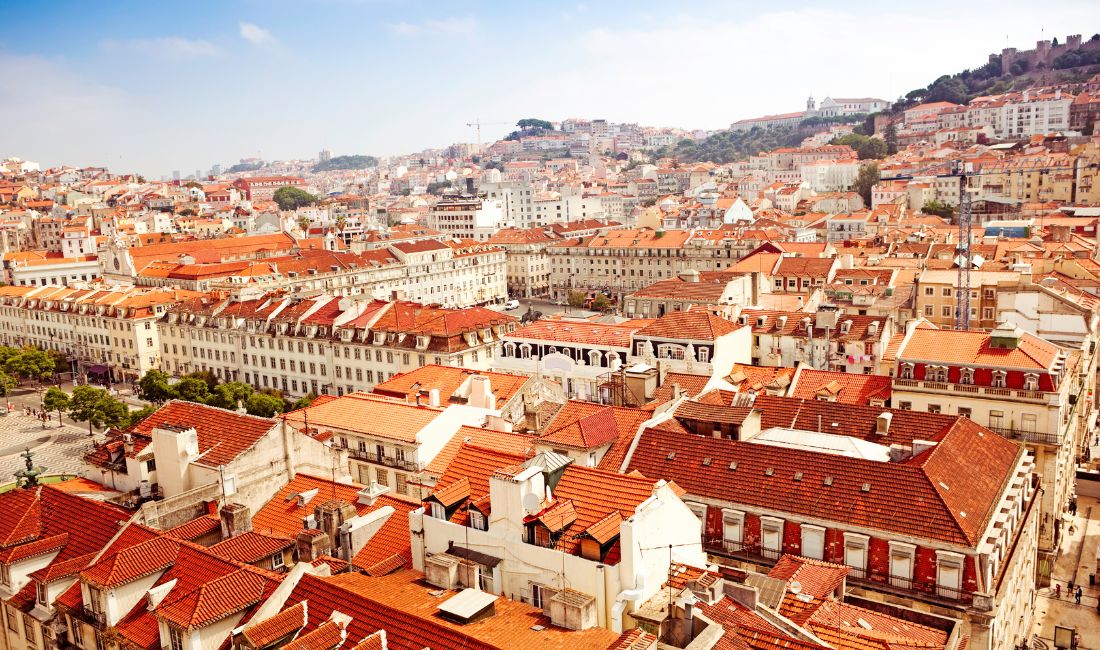
Chiado: Located adjacent to Baixa, Chiado is known for its elegant and upscale atmosphere. Expats living here have access to high-end shopping, theaters, and a vibrant arts scene. The neighborhood’s proximity to Bairro Alto also makes it a great spot for nightlife enthusiasts.
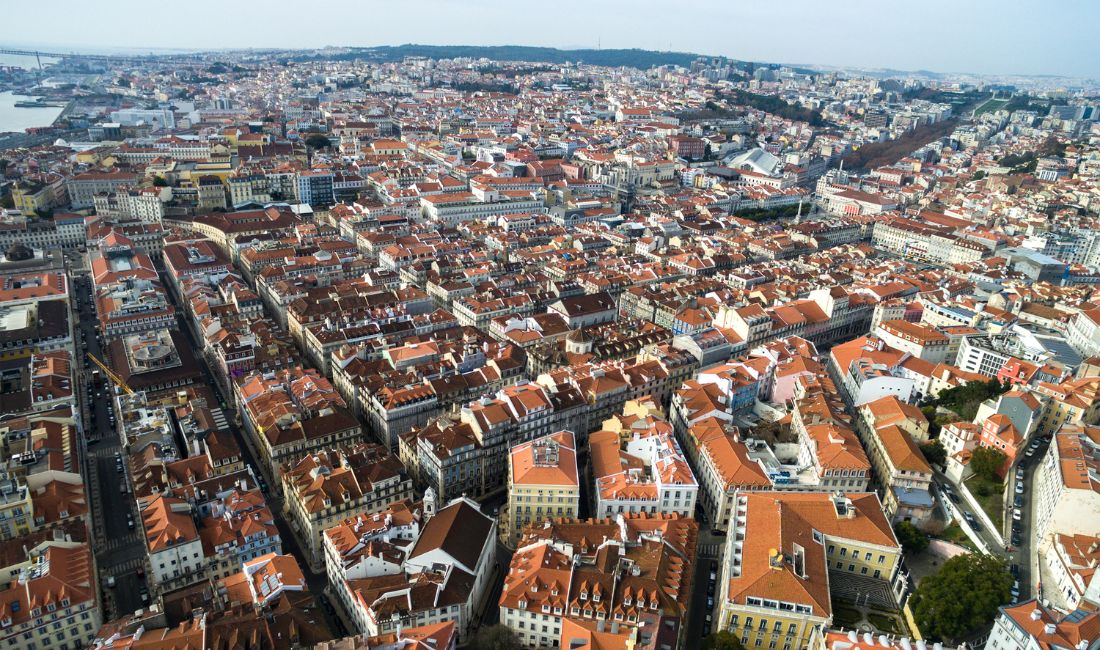
Alfama: Alfama is one of Lisbon’s oldest neighborhoods and is famous for its narrow, winding streets and historic charm. Expats looking for an authentic Portuguese experience will appreciate Alfama’s unique character, stunning river views, and fado music scene.
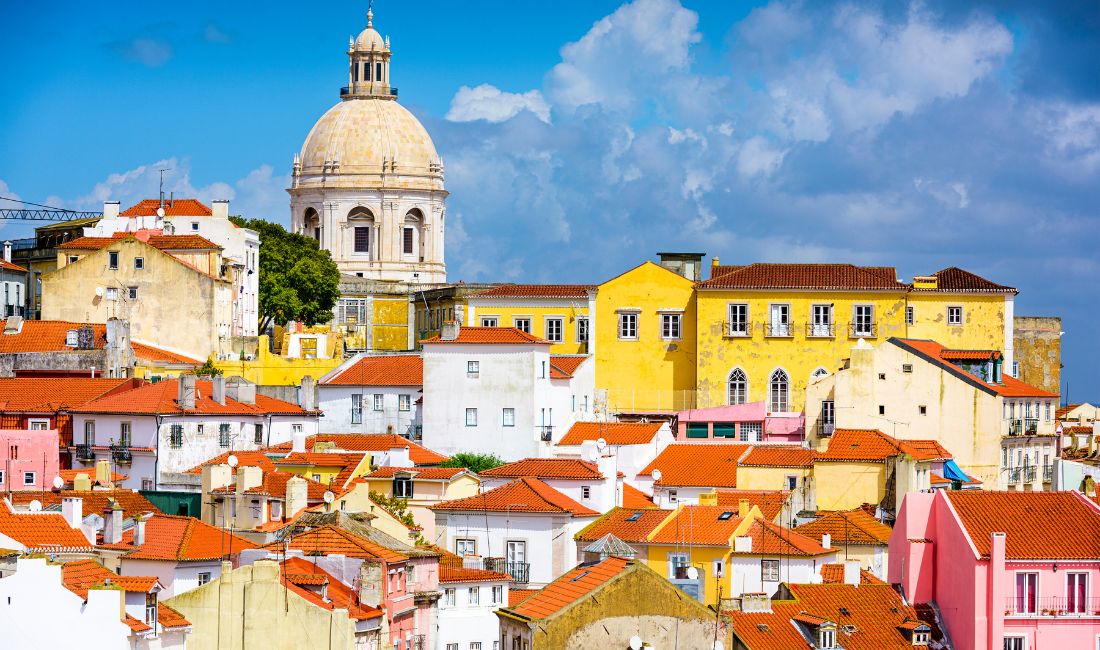
Bairro Alto: Bairro Alto is Lisbon’s bohemian neighborhood, known for its vibrant nightlife, trendy bars, and eclectic atmosphere. Expats who enjoy socializing and experiencing the city’s nightlife will find Bairro Alto an exciting place to live.
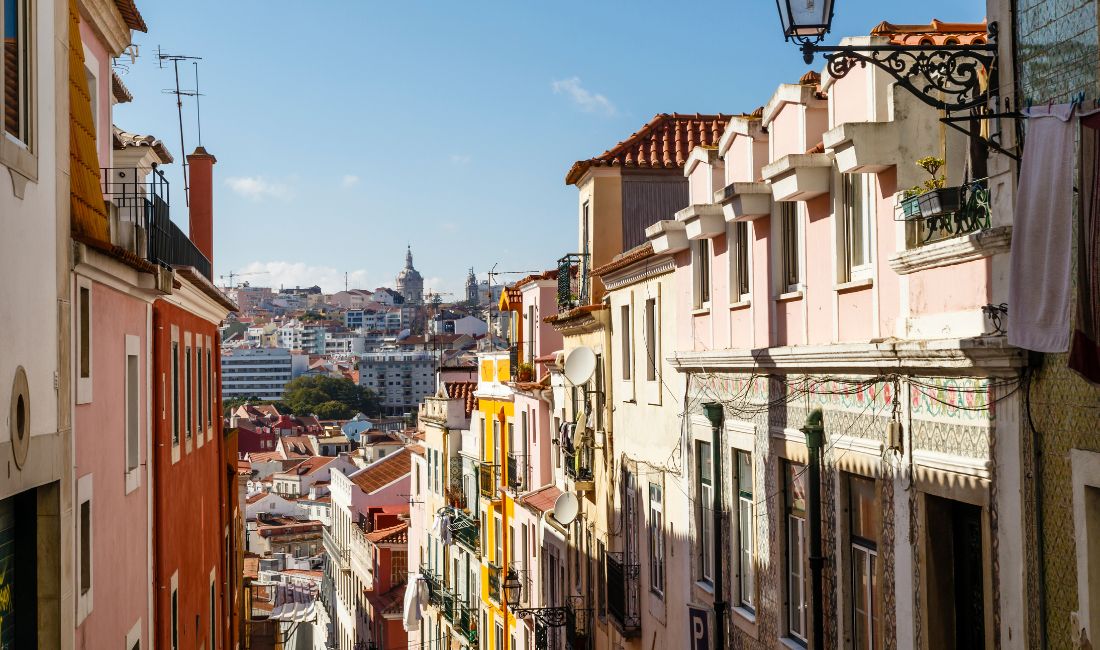
Parque das Nações: This modern neighborhood was revitalized for the 1998 World Expo and offers a more contemporary living experience, with spacious apartments, waterfront views, and easy access to amenities such as shopping malls, parks, and the Lisbon Oceanarium.
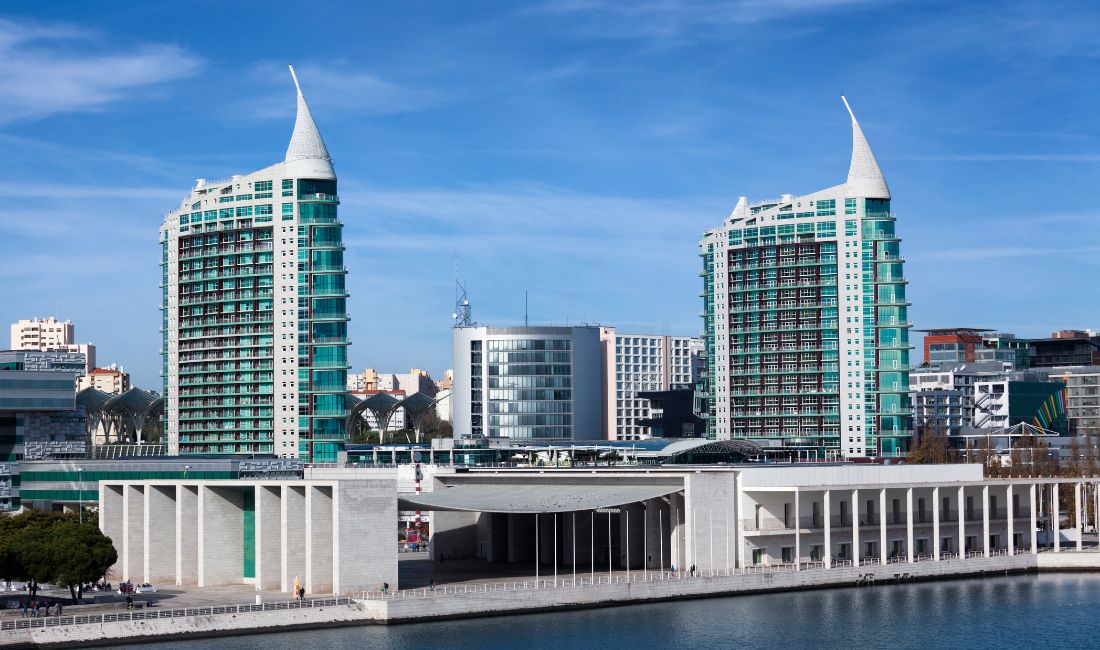
Best for families
Lapa: Lapa is a quiet, more residential neighborhood favored by expat families. It offers a peaceful atmosphere with tree-lined streets, elegant mansions, and proximity to several international schools.
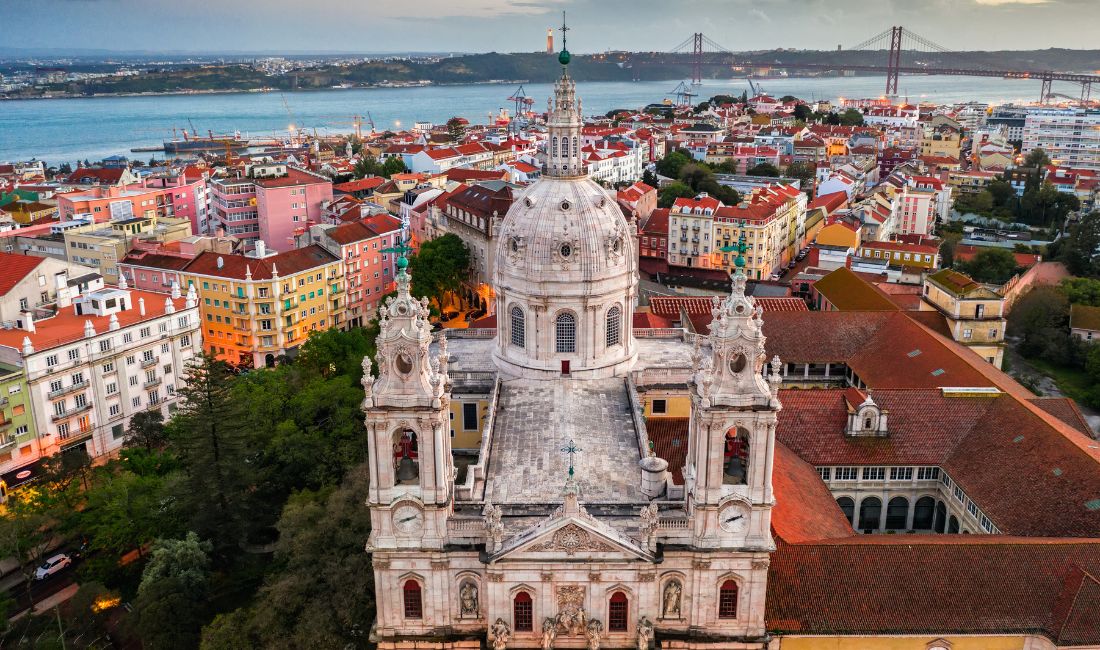
Campo de Ourique: This residential neighborhood is known for its tranquility and excellent quality of life. Expats can enjoy local markets, boutique shops, and a community-oriented atmosphere. It’s an excellent choice for families and those seeking a peaceful yet well-connected lifestyle.
Alvalade: Alvalade is a quiet family-friendly neighborhood in western Lisbon, known for its green spaces and residential charm. With easy access to public transportation, including the Metro, it offers convenience along with a mix of modern and traditional architecture. Jardim do Campo Grande, a large park in the area, adds to its appeal as a well-connected residential choice.
Estrela: Estrela is another family-friendly neighborhood known for its parks and green spaces, including Jardim da Estrela.
Education in Lisbon
Similar to the American school system, the school year in Portugal typically starts in September and ends in June, with several holiday breaks throughout. While Lisbon does have a public school system, classes are typically taught in Portuguese. Because of this, many expats whose children are still learning to speak Portuguese opt to send their kids to one of Lisbon’s excellent international schools.
Lisbon offers a variety of international schools providing education in English or other languages, often via international curricula such as the IB (International Baccalaureate) or the British curriculum. While these schools are usually more expensive with high tuition, they offer top-quality education in a multicultural environment, allowing kids to continue their education while assimilating into their new home.
Some international schools have more competitive admissions due to smaller class sizes and may also require proof of long-term residency in Portugal for admission. Alternatively, some private Portuguese schools also offer bilingual programs or international sections, which can be a compromise between full immersion in Portuguese and an entirely international education.
International schools
Here are some of the top international schools in Lisbon:
St. Julian’s School: Known for its diverse student body and strong academic standards, St. Julian’s is one of the most well-known international schools in Lisbon, offering the British National Curriculum from preschool to A-levels.
Carlucci American International School of Lisbon (CAISL): CAISL follows an American curriculum and offers an IB program. It’s recognized for its rigorous academics and strong emphasis on student development and extracurricular activities.
International Preparatory School (IPS): IPS provides an American-style education for students from pre-K to grade 12. Parents value this option for its small class sizes, individualized attention, and emphasis on character education.
For German and French speakers, there’s also the Deutsche Schule Lissabon and the Lycée Français Charles Lepierre.
How to build community in Lisbon
Building a sense of community as an expat can greatly enhance your experience and help you feel more at home. While it can take time to make lasting connections and form a social circle, Lisbon’s big expat population and warm, welcoming locals mean that new residents have plenty of opportunities to become part of the community.
Along with diving into local life by attending festivals and events, here are some ways expats can connect with others and build a community in Lisbon:
Join online expat groups: Online groups and forums dedicated to expats, like the Lisbon Expat Meetup Group and InterNations Lisbon, are excellent resources for connecting with others in Lisbon. Not only can longer-term expats answer questions and offer support to new residents, but you can also learn about in-person events and meetups.
Language exchange: Learn Portuguese and meet locals and fellow expats by participating in language-exchange programs or groups, like SPEAK Lisbon and Lisbon BlaBla. These exchanges can be a great way to make friends, learn about different cultures, and, of course, improve your language skills.
Local clubs and hobbies: Pursue your hobbies by joining clubs or classes in Lisbon related to your interests, like sports, art, dancing, or book clubs. This list covers 30+ societies, groups, and clubs around Lisbon that are open to new members, including dance classes and running and sailing clubs.
Make connections at work, school, or in your neighborhood: Co-workers, neighbors, and fellow parents at your kid’s school will be among the first people you have regular interactions with in a new city. Cultivate these relationships by introducing yourself off the bat, striking up conversations, and initiating offers to hang out. Explain that you’re new to the area and are looking to make new friends and acquaintances; that way, you can extend invitations for events like housewarmings or holiday parties, and your coworkers and neighbors can keep you in mind when opportunities to hang out come up.
Coworking spaces: Due to Portugal’s popular digital nomad program, remote workers have been flocking to Lisbon. Unfortunately, if you work from home, it makes it more difficult to meet people in person. Join coworking communities, like Kübe, Lisbon WorkHub, and Heden, to meet fellow digital nomads, freelancers, and remote workers through events and networking opportunities.
Navigating health care in Portugal’s capital city
Portugal has high-quality public and private health-care systems, allowing expats to choose the best option for their healthcare needs and budget. Public health care in Portugal is generally affordable for residents and EU citizens, with modest copayments, while private health-care costs can vary significantly depending on your insurance plan and the services you require.
Here are some key things expats need to know about getting health care in Lisbon.
Types of health care
Public health care: The public Portuguese health-care system, known as the Serviço Nacional de Saúde (SNS), provides health-care services to residents, including expats who have registered as residents. It offers comprehensive care, including doctor visits, hospital stays, and emergency services. To access public health care, you’ll need a user card (Cartão de Utente), which can be obtained by registering with the local health center (Centro de Saúde) in your area. One downside of the public system is that there are often long wait times for appointments with specialists.
Private medical insurance: While public health care is available and generally of good quality, many expats opt for private health insurance to have quicker access to health-care services and additional coverage. Private health-insurance plans are available from both local and international providers, covering things like private hospital care, specialists, and dental care. Going to private facilities, you’re also more likely to find English-speaking doctors and staff, which is helpful if you’re still learning Portuguese.
EU Health Insurance Card: If you’re an EU citizen, another option for healthcare coverage is the European Health Insurance Card (EHIC), which allows you to access healthcare in Portugal on the same terms as Portuguese nationals. You should obtain this card from your home country before moving to Lisbon.
For non-EU citizens, you may need to arrange private health insurance or, if eligible, apply for the Portuguese National Health Service (SNS) through the appropriate immigration process.
Top hospitals in Lisbon
As Lisbon is home to several highly regarded universities, many of the city’s top hospitals and health-care facilities are teaching hospitals associated with different higher-education institutions. These are some of the best hospitals in the city that expats can turn to for top-quality, reliable care:
Hospital de Santa Maria: As one of the largest and most renowned public hospitals in Portugal, Hospital de Santa Maria offers a wide range of medical services, including specialized departments and advanced treatments. It is affiliated with the University of Lisbon and serves as a teaching hospital.
Hospital da Luz: Known for its state-of-the-art facilities and high-quality healthcare services, Hospital da Luz is one of the leading private hospitals in Lisbon. It offers a comprehensive range of medical specialties and is staffed by well-trained medical professionals.
Hospital da CUF Descobertas: Part of the CUF network of private hospitals, Hospital da CUF Descobertas is a modern facility with a focus on patient comfort and advanced medical technology. It provides a variety of medical services and has a strong reputation for quality care.
Hospital Lusíadas Lisboa: Another prominent private hospital, Hospital Lusíadas Lisboa has developed a solid reputation for its multidisciplinary approach to healthcare. It offers a wide range of medical specialties and services, including diagnostic imaging and surgery.
Banking and money in Lisbon
One of the most important parts of getting yourself set up in a new city is opening a bank account and getting your finances squared away. From local banks, like Millennium BCP, Caixa Geral de Depósitos and Novo Banco, to international options, like Banco Santander, expats in Lisbon have a variety to choose from for their banking needs.
Opening a bank account
Your ability to open a bank account may depend on your residency status. If you’re a resident, you can generally open an account with fewer restrictions; non-residents may encounter more requirements and limitations.
Obtaining a Portuguese tax identification number (NIF) is a crucial step, as it is often required for various financial transactions and official documents. You can apply for an NIF at a local tax office or through some banks.
Once you have your NIF, you’ll also need to provide the following documents in order to open a bank account:
Passport or national ID cardProof of address (such as a utility bill or rental contract)
Proof of income or employment (some banks may require this)
While some banks will allow you to open an account online, others require in-person visits.
Getting around in Lisbon
As with many other European capitals, Lisbon is a very walkable city that’s easy to navigate on foot. But as Portugal’s largest city, you’ll also need to figure out other transportation methods to get around town.
Driving in Lisbon
While Lisbon’s narrow and hilly streets make for dreamy strolls and a charming setting to call home, they’re not the best for driving. Not only can they be difficult to navigate, but they make finding parking especially complicated, so lots of expats prefer to use public transportation to get around. But if you do want to drive a car in Lisbon, you’ll need to get the proper credentials.
Expats from EU countries can use their EU driving license in Portugal, but non-EU expats may need an International Driving Permit (IDP) in addition to their home country’s driving license. Requirements vary by country so be sure to check yours. You’ll also need to familiarize yourself with Portugal’s rules of the road. If you really need a car for short errands, like moving furniture or trips outside the city, Lisbon has several car-sharing services, like DriveNow and emov, which allow you to rent cars for short periods.
Mass transit
When it comes to getting around Lisbon, public transport is the way to go, be it by bus, tram, or ferry. The modern and extensive Lisbon metro system serves the city and suburbs, with buses reaching areas not served by the metro. But it’s arguably the trams, with their sunshine-gold and white exteriors and classic style, that are the stars of Lisbon’s mass transit system. Offering six different lines throughout the city, they can be used for both commuting and sightseeing in historic areas.
Along with land-based mass-transit methods, Lisbon’s proximity to the Tagus River facilitates ferry services that cross the river to destinations like Cacilhas and Trafaria.
While you can pay for single-ride tickets in cash, the Viva Viagem card is the way to go for expats who will be using mass transit on a regular basis. Costing €0.50, this rechargeable, reusable card can be used for metro and bus rides and also provides discounted fares.
Things to know about living in Lisbon
Before moving to Lisbon, it’s essential for expats to familiarize themselves with some of Portugal’s cultural differences and customs. This helps ensure both smooth transitions and positive interactions with the local community.
Greeting etiquette: Portuguese people typically greet each other with a warm handshake, sometimes with a kiss on each cheek, but not necessarily in professional settings. Be prepared for friendly greetings, but always follow the lead of your Portuguese counterparts.
Punctuality: While punctuality is important in professional settings, such as business meetings and appointments, social gatherings often have a more relaxed approach to time, and arriving a little late is generally acceptable.
Personal space: Portuguese people tend to stand relatively close during conversations, which may feel intrusive to some. This is a cultural norm, and maintaining eye contact is also considered polite.
Gestures: Avoid using the “thumbs up” gesture, as it can be seen as rude in Portugal. Instead, use a thumbs-up with the hand closed, resembling the OK sign.
Loud conversations: Talking loudly in public places, especially in restaurants, is considered impolite.
Be prepared to deal with bureaucracy: Many expats have reported that Portuguese bureaucracy can be difficult to navigate. Government offices hold strange hours, wait times are long, and processes can be overly complicated and contradictory. While it can be frustrating, be patient and go with the flow. Going in person to talk with people is better than calling or emailing, and you may need a translator if your Portuguese isn’t so good yet.
Weather: While the majority of the year offers good weather, it can get properly cold here during the winter. Many apartments don’t have central heating, so it’s worthwhile to invest in a space heater and some warm clothing during the winter months.
Preparing for expat life in Lisbon
With its lovely architecture, vibrant culture, delicious cuisine, and friendly locals, Lisbon can be a fantastic place for globetrotting expats to call home. In addition to offering visa assistance, an experienced immigration specialist can help you navigate the complexities of settling in and adjusting to expat life. Contact Newland Chase for a quote today.



